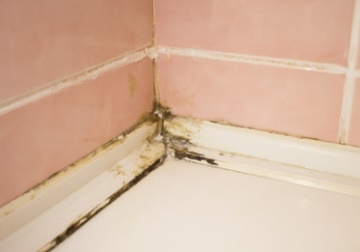Find a pre-screened local mold removal specialist Free Estimate
Find a Mold Specialist Now
Click or Call, Toll-Free 24/7
Vertigo From
Indoor Mold Exposure
Exposure to mold in the home can lead to vertigo, a feeling of lightheadedness or dizziness. It might feel as if the room is spinning around you or you might feel as if your body is spinning. You may also have a headache and feel nauseous or throw up. You may begin to sweat and may experience ringing in the ears or even have trouble hearing. You may feel as if you are going to faint. The feeling may last for only a few minutes or it may last for several hours or even longer.
Why Does Mold Cause Vertigo?
Any illness can cause you to feel lightheaded or dizzy, including mold-related infections. Infections affecting the inner ear, including ear infections and sinus infections, are particularly likely to upset your sense of balance. There is a reason for that.
There is a tube in your ear called the Eustachian tube. This tube connects the middle ear to the back of your throat. It helps equalize pressure in your ears and that helps maintain your balance. Allergies, sinus infections and ear infections can all cause the Eustachian tube to become clogged with mucus, and this affects the pressure in your ear and upsets your sense of balance.
Mold grows outdoors as well as indoors, of course, but the concentration of mold spores is much higher when mold is present indoors, creating a much greater risk.
See Your Doctor if You Feel Dizzy
If you begin feeling lightheaded or dizzy, you should see your doctor.
Many different things can make you dizzy, most of them unrelated to mold, including:
- Bacterial or viral ear infections
- Bacterial or viral respiratory infections
- Environment allergies (including mold allergies, but also seasonal allergies, allergies to pet dander, etc.)
- Low blood pressure
- Dehydration
- Heart problems
- Some medications
- Benign paroxysmal positional vertigo (BPPV), a condition in which tiny particles of calcium in the inner ear are displaced, sending the body confusing messages about where it is in space, causing a dizzy sensation
- Meniere’s disease, a condition in which fluid builds up in the inner ear, causing a dizzy sensation, ringing in the ears and hearing loss
- Migraine headaches
Your doctor will do a complete history and physical, asking you about all your symptoms and checking your vital signs. Your doctor may order some tests, including blood tests and an echocardiogram. Audiologists sometimes perform tests for certain conditions that can make you dizzy, too. Your doctor may also recommend having your hearing tested.
You may be referred to one or more specialists, including an infectious disease specialist, a cardiologist, and/or an otolaryngologist (sometimes referred to as an ear, nose and throat doctor or an ENT). Since problems with the inner and middle ear often contribute to feeling dizzy, ENT specialists often treat vertigo. Sometimes hearing is also affected by the condition, but not always. You can read more about hearing loss related to mold. It can take a while to determine the cause of dizziness and to find a treatment that works.
Make sure you let your doctor know about all the symptoms you are experiencing and what makes your lightheadedness better and what makes it worse. Also tell your doctor if you’ve been exposed to mold.
 Mold in corner of bathroom
Mold in corner of bathroomTreatment for Vertigo
The recommended treatment will depend on what your doctor determines is causing you to feel dizzy. Sometimes it simply goes away on its own as the cause of the problem resolves or the brain adapts. In other cases, medication may be needed or you may be referred to a physical therapist for a special type of physical therapy called vestibular rehabilitation.
If a mold-related infection is making you feel dizzy, you may need antifungal medication, antibiotics, or other medications for the infection. In addition, you’ll need to arrange for the mold to be removed from your home so that you won’t continue to get sick from exposure.
For Help with Mold Removal
Mold removal will be an important part of your treatment if mold is causing you to feel dizzy. If you are experiencing mold-related health problems, doctors often recommend against attempting to remove mold on your own because doing so will further expose you to the substance that is making you sick. We suggest scheduling a free consultation with a mold removal professional, who will visit your home, inspect the mold growth there, and advise you about the work that needs to be done. Even if you opt to do the work yourself, you can benefit from some valuable advice about the job, including safety tips. To find experienced mold removal professionals offering free consultations in your area, just follow the link.
Return From Vertigo To Our Main Symptoms Page
Ref:
Healthline
Free Home Inspection By A Mold Removal Specialist
Search This Website

Recent Articles
-
See Our 5 Recommended Mold Removal Companies in Covington, KY
Apr 16, 25 12:59 PM
-
See Our 5 Recommended Mold Removal Companies in Wheaton, IL
Jun 20, 24 10:33 AM
-
See Our 5 Recommended Mold Removal Companies in Aberdeen, SD
Oct 08, 21 04:05 PM




